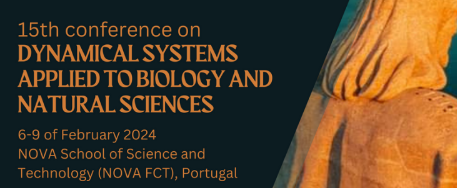The 15th Conference on Dynamical Systems Applied to Biology and Natural Sciences, DSABNS 2024, will be hosted by the NOVA SCHOOL OF SCIENCE AND TECHNOLOGY | NOVA FCT. The DSABNS 2024, will be held at Campus de Caparica, Portugal, from February 6-9, 2024.
The International Conference “Dynamical Systems Applied to Biology and Natural Sciences – DSABNS” is a well established International Scientific event that has been organized since 2010, every year during the month of February.
The conference program is designed to offer a diverse and enriching experience for attendees, covering research topics in scientific areas such as population dynamics, eco-epidemiology, epidemiology of infectious diseases, molecular and antigenic evolution and methodological topics in the natural sciences and mathematics.
The program includes Public Lectures, providing a platform for academic researchers from various disciplinary backgrounds to share their findings and insights with a wider audience. Plenary Lectures are also scheduled to open and close the scientific program, offering keynote talks from distinguished experts in the field during both the morning and afternoon sessions.
Invited Lectures complement the conference by providing context and broader perspectives for the parallel sessions, which feature Contributed Talks given by the conference participants. These parallel sessions create a stimulating environment for researchers to present their research findings and foster new collaborations. A limited number of Minisymposia, each consisting of 4-5 talks, will be organized. These sessions offer the opportunity to explore complex or emerging topics in greater detail than might be possible in general sessions.
Additionally, the conference hosts a Poster Session, creating opportunities for researchers to present their work visually and engage in discussions with their peers. The conference proceedings are documented in a Book of Abstracts with an ISBN, published at the end of the event, ensuring that the valuable research presented during the conference is widely accessible to the scientific community and beyond.

